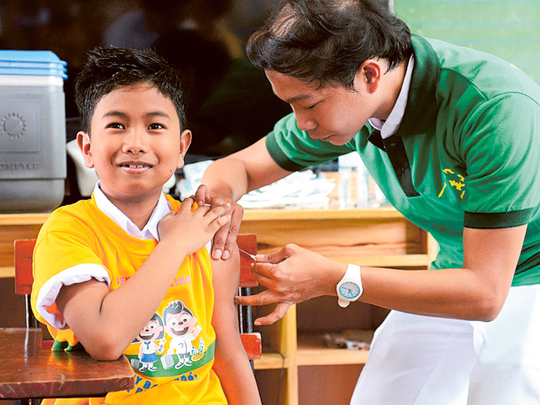
Manila: The Philippine food and drugs regulatory agency has barred pharmaceutical giant Sanofi Pasteur from advertising a vaccine for dengue, which it introduced in the country in December 2015.
According to the Food and Drug Administration (FDA), Sanofi Pasteur is prevented from airing commercials for its vaccine, on radio, television — as well as on social media.
“Sanofi was also directed to stop activities promoting and marketing the vaccine,” it said.
The Philippines was the first country in Asia to approve Dengvaxia.
As a result, several hundreds of thousands of Filipino public elementary schoolchildren have already been inoculated with the vaccine which is said to guard against dengue serotypes 1 and 2, which are the most prevalent in the country.
The adoption of the vaccine was approved by the FDA during the latter part of the administration of President Benigno Aquino III.
Dr Janette Loreto-Garin was at the helm of the Department of Health during that time.
“The airing of the advertisement is in violation of Administrative Order No. 65 s. 1989, prohibiting advertisement in any form of prescription or ethical drug,” the FDA is now saying.
“The FDA’s Centre for Drug Regulation and Research ... also reported the unauthorised promotion of dengue vaccine in the malls,” FDA Director General Nela Charade G. Puno said.
Earlier, there had been insinuations that the drug was adopted hastily to the advantage of certain officials.
Senator Richard Gordon, during a privilege speech delivered in the Senate in October 2016, questioned the previous Aquino administration’s sudden decision to procure Dengvaxia, which had yet to be given pre-qualification approval by the World Health Organisation (WHO). Officials had planned to inoculate 230,000 schoolchildren by April 2017, he said, without having tested at least 200 children first as required by WHO.
“We cannot have people playing God and pretending to be God,” he said as he described the Aquino administration’s “indecent haste” the vaccine just a few months before then President Benigno Aquino III was due to step down.
Aquino’s six-year term as president ended on June 29, 2016.
“The issue involved is the sudden decision made in the latter weeks of the previous administration. On December 22, 2015, the FDA approved a dengue vaccination to be introduced in the Philippines. On the same day, the then DOH Secretary announced that DOH was awaiting pre-qualification guidelines from WHO for the said vaccine. The pre-qualification ensures that vaccines procured are safe and effective. By April, the DOH started inoculating schoolchildren with the vaccine,” the senator said.
Some 200,000 Filipinos are infected with dengue every year.
Incumbent Health Secretary Paulyn Rosell-Ubial said the P3.5 billion (Dh258 million) used to procure the vaccines was not included in the department’s budget for 2016 but was given as additional allocation by the Department of Budget and Management, which was sourced from the unobligated funds of other agencies.
Gordon said the procurement had turned the Philippines into the “number one guinea pig in Asia” and exposed Filipino schoolchildren to danger.












